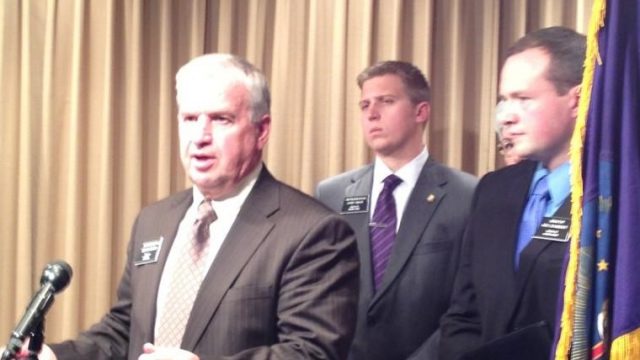North Dakota Democrats Introduce Raft Of Ethics Reforms Both Good And Bad

corey mock, mac schneider, jerry klein
Last year the Fargo Forum took a bribe from the George Soros-funded Center for Public Integrity to help produce a study claiming North Dakota was one of the states in the nation most at-risk for corruption. How much did the Forum take? They’re not telling, but this ridiculous study also managed to conclude that the state least at-risk for corruption was…New Jersey.
That just screams “credibility,” doesn’t it?
Anyway, that the study was simply laying the groundwork for a push for ethics reforms by Democrats is clear to anyone who was paying attention. And, indeed, the Fargo Forum reports today (without mentioning the aforementioned bribe, way to be ethical fellas) that Democrats have introduced a raft of new policies addressing transparency which would be implemented over through several different bills.
To be sure, not all of the ideas Democrats are proposing are bad ones. I like these bills:
HB1436, introduced by Rep. Ron Guggisberg, would require the same sort of campaign contribution transparency from legislative candidates as state candidates must adhere to. Currently statewide candidates have to report individuals/PAC’s who have contributed more than $200 during a year as well as a total of all contributions including those under $200.
HB1449, introduced by Rep. Josh Boschee, would require that both statewide and legislative candidates report campaign expenditures. Currently expenditures aren’t reported at all. Boschee’s bill would require all expenditures over $200 be disclosed.
SB2276, introduced by Sen. George Sinner, would require that legislators disclose any compensation they receive for travel from third parties related to their legislative duties (with exceptions for money from family, money from employers, etc.).
These are solid bills that will make our elections, and our government, more transparent. But the Democrats are also proposing some very bad legislation.
HB1444, introduced by Rep. Gail Mooney, would re-define anyone who “Drafts, promotes, or distributes model legislation with the purpose of influencing a member of the legislative assembly to introduce the legislation or vote in favor of the legislation through any means” as a lobbyist under the law, requiring them to register with the Secretary of State. Meaning that if a private citizen likes a policy promoted by some think tank, or that is currently law in another state, and communicates those feelings to a legislator they’re suddenly a “lobbyist.” This is clearly unconstitutional legislation and ought to be rejected.
HB1430, introduced by Rep. Ed Gruchalla would change North Dakota law to allow corporate spending (bringing the state into line with the Citizens United vs FEC Supreme Court ruling) but would also require that corporations report their independent spending to the Secretary of State, and the bill would also require that independent political groups advocating for or against candidates disclose not only their contributors but who their contributors work for. The bill does exempt “any position taken in any bona fide news story, commentary, or editorial,” but that might not include private citizens running blogs (gulp).
This bill is a clear and direct assault on free speech. As we watch Democrats nationally bully private individuals who dare support non-Democrat candidates, it’s not hard to think of North Dakota Democrats using these disclosure rules to target private citizens and businesses who are inconvenient for their political agenda.
Finally, the centerpiece of Democrat ethics reforms is HB1442, introduced by Rep. Corey Mock. It would create a totally unnecessary, nine-member ethics board which “may investigate a complaint alleging that any member of the legislative assembly, elected or appointed executive branch officer, judge of the district court, supreme court justice, candidate for elective legislative, executive, or judicial office, lobbyist, or state employee.” That might sound appealing, at first blush, but that this would quickly become an instrument for point-scoring and political vendettas is assured. Other states, including New Jersey which was lauded in the Soros-funded report mentioned above as being a model of ethics reforms, have panels like this and that’s exactly how they operate. They don’t stop ethical violations. They create political drama while adding another layer of bureaucracy to government.
The best “ethics board” that can be assembled is the voters. Put in place the necessary reporting and transparency laws to ensure that the public’s right to know is protected, and then let the people judge our leaders by their actions. If the people feel things are getting out of hand, they can and should vote for someone else. But the last thing we need is politicians creating a panel of politicians to investigate other politicians.







